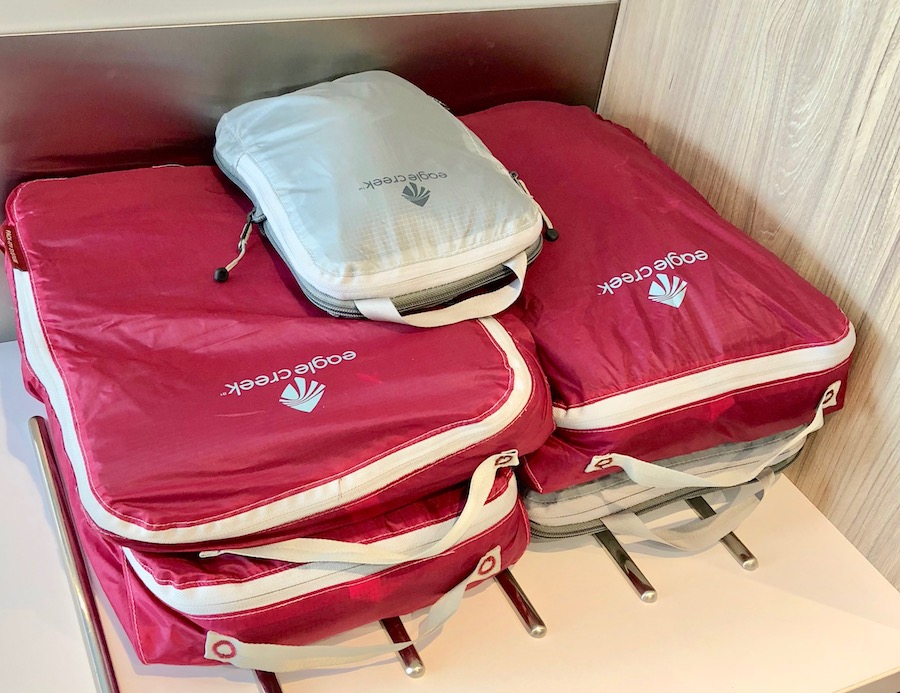Traveling can be challenging some times, particularly if it is to an unknown place or for a longer than normal time. Here are suggestions for ten things to do to make things a bit easier and more enjoyable on your next trip:
(1) Keep Small Change On Hand
Always keep small change and small bills handy so you don’t have to go digging to the bottom of your daypack, handbag, or fanny pack for money to use the WC, to buy water (or gelato), or for taxi fare.
(2) Learn The Basics Of A Language
Try to learn some basic words in the language where you are heading. Hello, goodbye, and thank you are always appreciated. These few words can open doors to new experiences or be a gateway to a new friendship. Also, learn “do you speak English?” (if that’s your native language), “how much does it cost?,” and “where is the restroom/WC?” It’s also good if you have a small phrase book so you can point to what it is you want to say; or, in these times of technology, a translator app on your phone that you can use offline.
(3) Take Some Time For Yourself
If you are tired, jet-lagged, or just not feeling well, it’s OK to take it easy. Listen to your body. Take a nap, get a massage, read a book, or chat with family or friends back home (check your data plan first). Downtime, whether it is a couple of hours, a day, or even several days, can be good for your body and soul.
(4) Pack Light And Do Laundry
I try to pack one week of clothes and then do laundry. My last trip was a cruise. Instead of sending my laundry out, I turned the sink and shower into a laundry. The shower had a clothesline, so I used binder clips (always have a few in my bag) as clothespins to hang the laundry up. If I’m lucky enough to have a washer or washer/dryer in an Airbnb, I make sure all my clothes are clean when I leave, whether that means doing one or several loads. If I haven’t done sink laundry along the way and I don’t have a washer/dryer available to me, then I hit a laundromat. Doing laundry in a language with which you are unfamiliar is an adventure. Or, if you want to be less adventurous or are pressed (pun intended) for time, you can always find a place that will do laundry for you (fluff and fold) for a price.
As for packing light, it makes it easier to lift your bag on and off trains, in and out of elevators, and upstairs. I also prefer to pack just a carry-on bag so I don’t have to check my bag on the way to my destination (I don’t mind checking it on the way back home). Unfortunately, a lot of airlines are reducing the size and weight of carry-on bags so it is getting tougher to do. Recently, I was slightly over the allowable kilo for carry-on, so I had to check my bag. I was not happy, but at least my bag made it to my destination.
(5) Enjoy Leisurely Meals
Take your time over meals; particularly in Europe ~ they are an event. You will never get the check until you ask for it and waiters don’t rush you. The philosophy is that you’ve bought the table when you ordered the meal. There have been several evenings when traveling with my husband or a friend, where we’ve spent 2-3 hours in a restaurant over dinner. We’ve never gotten the feeling we overstayed our welcome and often the waiter said, “what’s your rush, have a drink…”
(6) Try Something New
When it comes to food, always try the specialty of the house or the specialties of the area you are visiting. A meal will never taste as good as it will in the native environment. Step out of your comfort zone and try the wild boar or almost anything with truffles – you may find a food obsession. The same is true for activities ~ think outside the box. Look for things to do that are only done in that particular area or that you typically wouldn’t do at home. You’re in Costa Rica – go ziplining; you’re in Lapland, Finland – go dogsledding; you’re in Paris – learn to make croissants (I can attest that this activity is fun and delicious). The sky’s the limit on the fun things you can learn to do if you step outside your norm.
(7) Ask Questions Of Your Host
If you rent an apartment or AirBnB, ask lots of questions about the idiosyncrasies of the space before the host leaves. (Same is true for a hotel – don’t let the bellman leave before you ask questions.) You don’t want to be going to bed late only to find out you don’t know how to lower the outside blinds to make the bedroom dark, or leaving the apartment/room for an adventure and you don’t know how to use the safe or even if there is one. Knowing how to use the apartment’s kitchen appliances is important, as is knowing how to use the air conditioning or heat. Many places have a small hot water tank in the bathroom and it often has to be turned on before using the shower and then off again after you are done. Knowing how to do this beforehand will make your shower much more pleasant (and warmer). Also, make sure you have contact information for your host or whoever he/she has designated as the contact – it makes it easier when other questions come to mind (and they will).
(8) Ask Locals For Recommendations
Ask your host or someone at your hotel for restaurant recommendations. Not the typical touristy places – you want to know the restaurants your host frequents where you can get an authentic meal at a reasonable price. Ask the waiter in a restaurant you like where he/she goes for a good meal, a drink, or where they go when they have free time. Ask them, “If you had a good friend come to town, where would you tell them to go?” You are guaranteed to have a more authentic time. Even if you aren’t asking for a recommendation, strike up conversations with locals, waiters, store clerks, and other travelers. It’s amazing what you learn from others and what you have to offer strangers. Be open to the experience, the adventures, and the unbelievable memories.
(9) Learn To Share When Not Traveling Solo
When traveling with another person, divvy up the tasks. One person is the navigator and the other is the driver; one person plans activities on Monday and the other does it on Tuesday. Everyone on the trip should be involved in the planning and execution of the trip. There are fewer arguments and fewer hurt feelings when everyone has a say.
(10) Organized Packing Saves Space And Time
I always use compression sacks and packing cubes to keep my suitcase organized. I keep undergarments and socks in a small cube, shirts/blouses in a little bit bigger cube, and shorts/pants in a larger cube. If I’m taking a heavier jacket, I use a compression sack to reduce the amount of space it takes up. On the return trip, a compression bag is useful to compress down dirty clothes to save space in my backpack/suitcase, providing space for the few souvenirs I’ve purchased. Using organizer cubes/bags also makes unpacking more manageable and keeps like pieces of clothing together. This is particularly helpful when you are fumbling around in the dark to get dressed (don’t want to wake up a roommate or just don’t like turning on the light in the morning) since you’ll know where to find your stuff. Some people use different sized Ziploc bags instead of packing cubes or compression sacks – same result, different vessel.




Glad to see your blog up and running!
Thank you. It’s been a long time coming. 🙂
Great tips! Looking forward to reading more.
Thank you. I appreciate the feedback. 🙂